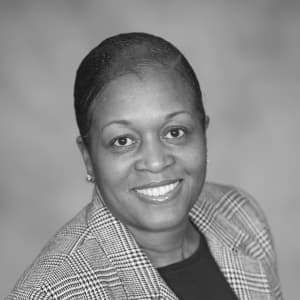13 Ways Institutions Can Support Black Nurses Seeking Leadership Roles

When I worked as an assistant nurse manager in the pediatric emergency room, four out of the six assistant nurse managers were underrepresented women. This is a rarity. Our nursing leadership played an instrumental role in the community we served and provided mentorship to other underrepresented nurses.
Studies consistently report advantages to diversity among nursing leadership, including:
- Improved health equity
- Improved healthcare outcomes
- More successful mentorship for underrepresented nurses
- Diverse global perspectives
- Inclusivity
Yet, the number of underrepresented nurses, specifically Black nurses , in leadership roles remains low. Even fewer Black nurses are in higher-level and executive leadership positions.
What can nursing institutions do to better support Black nurses seeking leadership roles? We spoke with four nurses who provided some answers.
These nurses also discuss their personal experiences and the challenges they faced as Black nurses aspiring to nursing leadership roles, and they offer advice on career advancement.
Climbing the Corporate Ladder as a Black Nurse
To even apply to a nursing leadership position, many Black nurses feel they have to:
- Exceed expectations
- Be overprepared
- Be overqualified
- Meet every requirement
“I have been in two major leadership positions in my career and I feel that I had to go above and beyond in my role to be considered for those leadership positions,” says Jamil Norman, Ph.D., with nearly two decades of nursing experience.
Tameka McDaniel, DNP, is the assistant director of nursing education services at Nightingale College and has been a nurse for 16 years. She recounts her path to leadership as a string of rejections.
After applying to leadership positions, she said she later found out the position was offered to a nurse “of a different ethnicity with less education and experience.” She experienced further rejection when applying to leadership roles in nursing education.
“As a Black nurse, I feel the constant pressure to prove myself, to have more education and experience than the competition,” McDaniel says.
It wasn’t until McDaniel was hired at Nightingale College, where diversity is deeply rooted in its mission, that she finally felt for the first time that her race and culture weren’t a deciding factor in her upward movement.
Many Black nurses have similar stories. Phyllis Morgan, Ph.D., FNP-BC, holds more than 29 years of experience in nursing. She recounts her path to leadership as challenging.
“There are microaggressions that have existed for years that have hindered Black nurses being promoted,” Morgan says.
Although diversity and inclusion are on the agenda of every nursing organization and stakeholders, Black nurses still experience significant hurdles in getting leadership positions.
Obstacles Black Nurses Face Pursuing Leadership Roles
Racism, microaggressions, nepotism, and implicit bias are frequent reasons Black nurses do not get hired into leadership roles. Nurses who hold leadership positions often report experiencing discrimination and being the only minority in senior leadership.
“Statistics have unfortunately revealed that the higher up you are in a role, the less likely you are to see someone else who looks like you at your level,” says Charles Lapsley, MSN, RN.
This causes Black nurses to feel leadership roles are out of reach or to not pursue them at all.
“When people don’t see themselves represented in leadership, the door seems closed, meaning there isn’t an opportunity for entry,” McDaniel says.
Similarly, another obstacle faced by Black nurses is not being recognized or considered by management as an option for leadership opportunities. Due to the lack of Black nurses already in leadership positions, Black nurses are less able to benefit from the professional or social capital gained through having a relationship with someone near the top.
More needs to be done to support Black nurses seeking leadership positions. Although nursing institutions are not the only solution, they are a crucial starting point.
What Nursing Institutions Can Do to Support Black Nurses Seeking Leadership Roles
Nursing institutions must be intentional in supporting Black nurses seeking leadership roles. Norman has 16 years of experience as a nurse and knows it is a tremendous feat to promote diversity, equity, and inclusion.
This is why Norman says hiring managers and nurse executives should consider partnering with ethnic minority nursing professional organizations. These partnerships are one proven strategy to improve diversity in senior leadership.
Proven Strategies Institutions Should Adopt to Support Black Nurses
- Create a culture of inclusion. Organizations can support Black nurses by ensuring that their mission aligns with representing people from all ethnicities, cultures, and backgrounds.
- Acknowledge that implicit bias is real and white privilege exists.
- Acknowledge gaps in diversity and inclusion and intentionally work to close them.
- Have frequent candid, open discussions with Black nurses and follow-up conversations.
- Conduct measurable surveys and commit to actionable results.
- Provide mentors to Black nurses.
- Hire managers and administrators who are Black.
- Have no-tolerance policies that protect Black nurses against racism.
- Include Black nurses at the table when making decisions on how to hire and retain nurses.
- Take time to listen to Black nurses who have experienced institutional racism in nursing. Take the opportunity to listen, learn, and correct these issues.
- Provide nursing leadership development and continuing education opportunities.
- In addition to , ensure the organization has committed to cultural sensitivity training for all team members, including collaborative physician/provider partners.
- Organizations can align with Black nursing organizations that will increase their ability to network with other like-minded, tenured, diverse healthcare professionals who can serve as potential mentors and advisors.
“Black nurses need to feel valued and providing these opportunities can help to narrow the gap of racial inequality,” Norman says.
Lapsley says it’s important to understand that unique opportunity exists within every culture, including Black culture.
“We need to be willing to bring issues forward and determine actionable ways to address concerns,” he says.
Data also reveals colleges and universities need to prioritize diversity in nursing, even during these unprecedented times. If they are to keep up with the demographic changes happening today, they must catch up.
Advice for Black Nurses Seeking Career Advancement
Lapsley didn’t get his current position the first time he applied. He is the director of Trauma, Emergency Services, Critical Care, and the Firefighters Burn Center at Regional One Health in Memphis, Tennessee. He describes his experience as bothersome.
“Rejection can often have an effect on one’s ego and, in full transparency, it did bother me,” Lapsley says.
Lapsley felt prepared for the role when he applied. He met the education requirements, participated in special projects, facilitated committees, and had the overall support of key stakeholders.
But after completing the initial interview process, he says it was clear that he was not the person they were looking for. This didn’t deter Lapsley from going after the position again and securing the role the second time around. He advises Black nurses to do the same.
“I believe it’s important to never give up on what you are passionate about,” Lapsley says.
Going for a position, not once but twice, shows your perseverance and passion. Many may disagree, but if you know you are right for the position, why not keep pursuing it?
Seeking out mentorship in nursing is important and becoming a mentor to other Black nurses is a key way to support fellow nurses in their rise to leadership positions. But this is contingent on Black nurses holding positions of leadership.
“It is vital to have Black nurses in leadership to serve as role models and mentors for other Black nurses seeking leadership roles,” Morgan says.
Additionally, Norman believes it is important to be active in professional organizations and seek out specialization opportunities.
She advises Black nurses to seek out nursing certifications and advanced education. Being involved and informed helps to foster professional relationships.
“You want to be an expert in your field,” Norman advises.
9 Tips for Career Advancement
Find a mentor
Find a mentor who will help you move forward in your career. Mentorship is a foundational aspect of leadership success. Finding a mentor isn’t easy so you may have to actively seek one out.
Leverage social media platforms
Find Black leaders on social media. Message them with thoughtful questions. Increase your professional social media presence and be mindful of your personal social media presence.
Develop a plan
Follow it and adjust along the way.
Identify your core values
Identify your core values and develop a personal leadership philosophy, and stick by these.
Learn the art of negotiation
Knowing how to negotiate as a nurse is an important skill all nurses should have.
Be active in professional organizations
Take advantage of nursing professional organizations and stay informed to help foster professional relationships.
Seek out certifications and advanced education
Be an expert in your field.
Stay updated
Professionally prepare your nursing resume/CV and update it periodically.
Volunteer for committees or projects
Create a space where you can collaborate across the organization.
It is important for Black nurses to go for leadership positions and to remember the bigger picture. There are so few in leadership roles, so it is imperative to remind ourselves we are creating a path for future underrepresented nurse leaders.
This cannot be achieved alone. We need the support of nursing institutions and stakeholders to make diversity and inclusion a talking point and reality.
Meet Our Contributors

Jamil Norman is an academic coordinator for Walden University’s RN-to-BSN program. She has more than 16 years of experience as a registered nurse and 12 years in higher education. Her areas of expertise include nursing research and women’s health nursing. At Walden, Norman teaches foundations of nursing research and topics in clinical nursing.

Phyllis Morgan is a faculty member for Walden University’s master of science in nursing program and holds more than 29 years of experience in nursing. Morgan has been a certified family nurse practitioner (FNP) for several years and is senior core faculty and academic coordinator for the FNP specialty at Walden. She also currently works as an FNP for CVS Caremark Minute Clinic in northern Virginia.
Morgan’s research focuses on African American men’s and women’s health issues. She has published several research articles, presented at national and international conferences, and written grants on health disparity issues among African Americans.

Charles Lapsley is a graduate of Walden University’s master of science in nursing program and Director of Trauma, Emergency Services, Critical Care and the Firefighters Burn Center at Regional One Health in Memphis, Tennessee. Lapsley has over 22 years of experience as a nurse, including several years as a nurse leader. He is an active member of the American College of Healthcare Executives, Emergency Nurses Association, and American Burn Association. Lapsley was an honorary member of the White House medical unit in 2018.

Tameka McDaniel is the assistant director of nursing education services at Nightingale College. Originally from Detroit, Michigan, she has been a registered nurse for 16 years with nearly 14 years of experience as a critical care ICU nurse. McDaniel began her career with an associate degree in nursing from Wayne County Community College. She then earned a bachelor’s in nursing from Oakland University, a master of science in nursing from South University, and a doctor of nursing practice in healthcare systems leadership from Chamberlain College of Nursing.